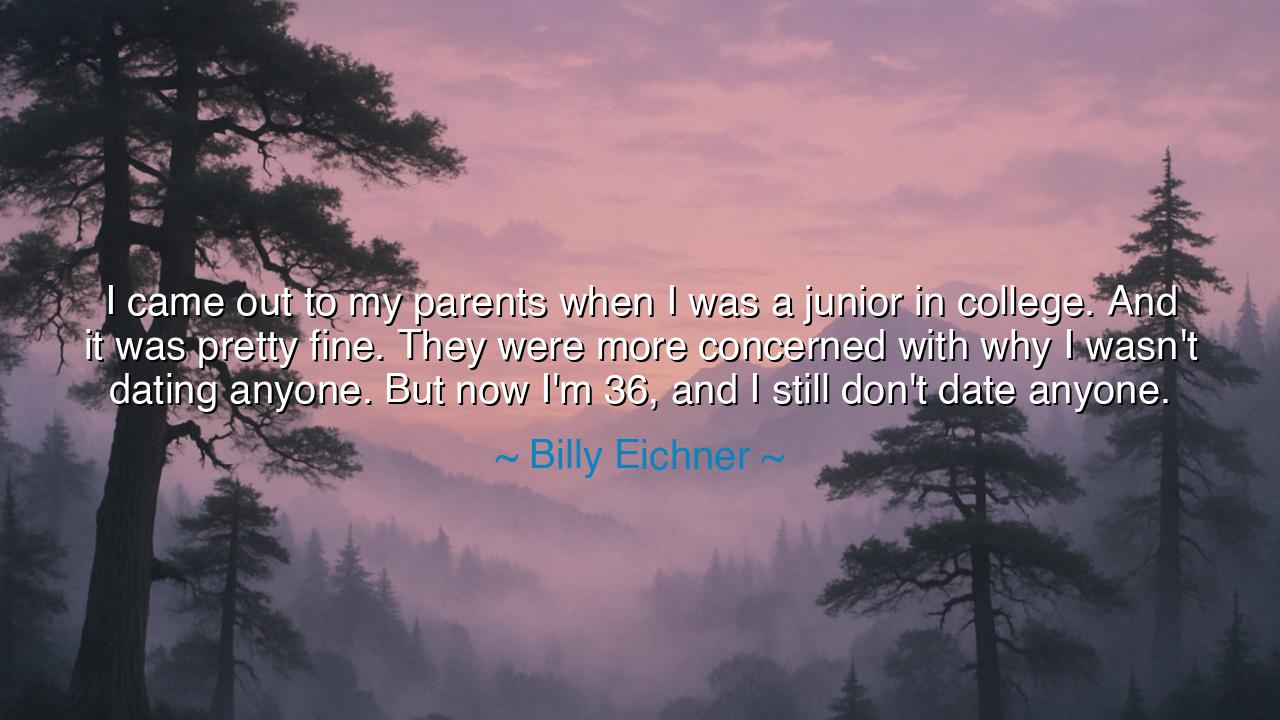
I came out to my parents when I was a junior in college. And it
I came out to my parents when I was a junior in college. And it was pretty fine. They were more concerned with why I wasn't dating anyone. But now I'm 36, and I still don't date anyone.






When Billy Eichner said, “I came out to my parents when I was a junior in college. And it was pretty fine. They were more concerned with why I wasn’t dating anyone. But now I’m 36, and I still don’t date anyone,” he spoke with the humor that often cloaks deep truth. Beneath the laughter lies the voice of a man who has wrestled with identity, expectation, and the slow, complicated journey toward self-acceptance. It is a confession both tender and ironic — for it reveals not only the challenge of being seen by others but also the quiet struggle of learning to be at peace with oneself.
The origin of this quote comes from Eichner’s reflections on his own life — a life lived in the public eye as an openly gay man and performer in an industry that often prizes perfection over authenticity. His words arise from the intersection of two great pressures: the desire for love and the expectation to conform. When he jokes that his parents were “more concerned” about his lack of dating than his coming out, he exposes a subtle truth about modern life — that even as society grows more tolerant, it still measures fulfillment through relationships, as if solitude were a flaw to be corrected.
The ancients understood this dilemma well. The Greek philosopher Diogenes chose to live alone in simplicity, rejecting society’s standards of success. When people questioned his solitude, he replied that he was free from the chains of imitation. Like Diogenes, Eichner’s words suggest a kind of quiet defiance — a recognition that one can be whole without fitting the molds others create. His humor disarms, but his meaning endures: that the journey toward authenticity is often lonely, yet sacred. The absence of a partner does not diminish the presence of a soul.
Still, there is tenderness beneath his jest. The longing to be understood, to connect deeply, lingers in his tone. To be seen is a fundamental human desire — one that transcends orientation, culture, or time. The poet Rumi once wrote, “The minute I heard my first love story, I started looking for you.” Eichner’s words echo this timeless longing, yet they also remind us that love, in its purest form, begins not with another, but within oneself. The greatest relationship, as the wise have always taught, is between the self and the soul — the harmony that comes when one accepts one’s path, however unconventional it may be.
His reflection also carries a quiet critique of modern life’s obsession with romance as proof of happiness. We are told that to be single is to be incomplete, that fulfillment must come through coupling. Yet the ancients — from Socrates to the mystics of the East — taught that peace and purpose are born of inner contentment, not external validation. Eichner’s candor, then, becomes an act of rebellion: to admit, without shame, that one’s journey does not follow the expected script. In doing so, he offers freedom to others who feel the same — the freedom to live authentically, without apology.
From this, we may draw a lesson that is both simple and profound: do not measure your worth by the expectations of others. Whether in love, work, or identity, live as the truest version of yourself, even when that truth stands apart. The ancient Stoics taught that tranquility comes not from pleasing the world, but from aligning the heart with reason and integrity. Likewise, Eichner’s story reminds us that happiness is not found in ticking society’s boxes, but in knowing who you are and embracing it without fear.
And so, let Billy Eichner’s words stand not as a lament, but as a hymn to individuality. To be single, to be different, to walk a path of your own choosing — these are not failures, but triumphs of courage. The world may not always understand such freedom, but the soul does. To those still searching for love, or for peace within themselves, let this truth be your guide: live with honesty, walk your path without shame, and remember — the greatest act of love is to be wholly, unapologetically, yourself.






AAdministratorAdministrator
Welcome, honored guests. Please leave a comment, we will respond soon